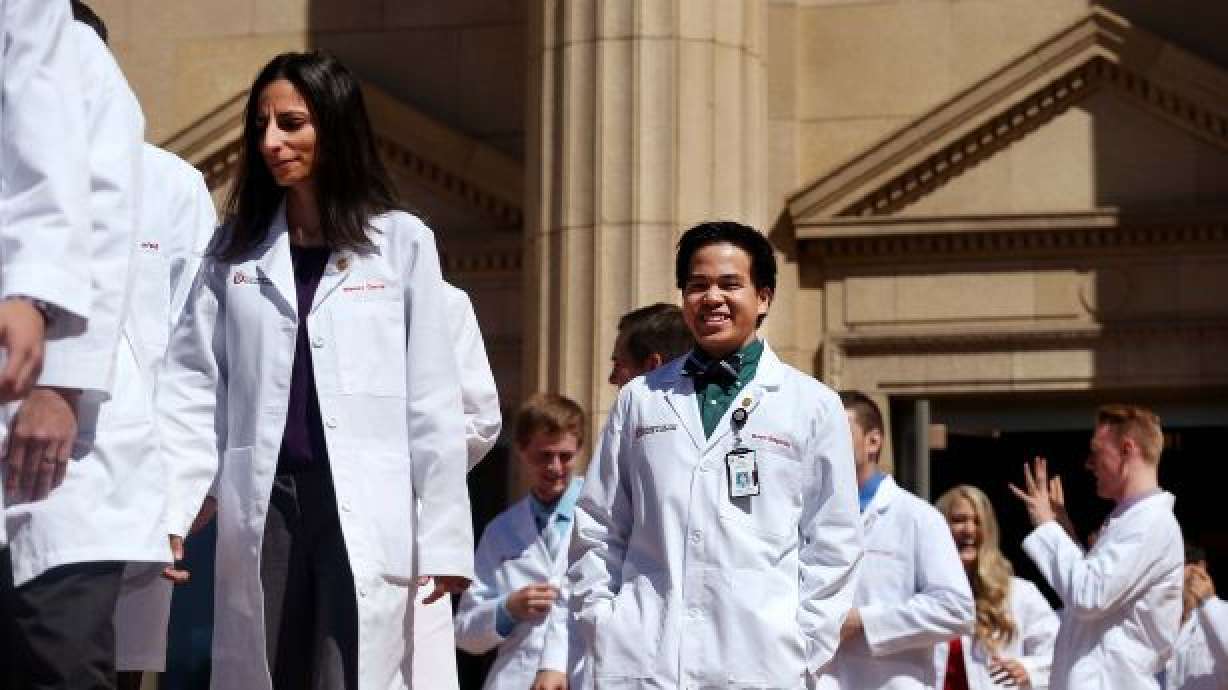Estimated read time: 4-5 minutes
This archived news story is available only for your personal, non-commercial use. Information in the story may be outdated or superseded by additional information. Reading or replaying the story in its archived form does not constitute a republication of the story.
SALT LAKE CITY — In an effort to make health care more accessible and holistic across the western region, the University of Utah School of Medicine announced this week it is partnering with Intermountain Healthcare to create a new medical education program to launch later this year.
The new program will represent a "seismic shift" in the future of health, said Dr. Michael L. Good, the dean of the University of Utah School of Medicine and interim president of the U.
According to Good, it's estimated that 90% of health care expenditures are spent on chronic conditions such as mental health conditions or heart disease, and a large number of those conditions and complications can be addressed through prevention.
That's why the new educational program will focus on population health medical curriculum, which will teach physicians to consider a patient's economic and social backgrounds as it relates to their physical health. This model can help prevent illnesses and promote better health, Good said.
Illness prevention needs to be a critical component of the health care landscape, he added. The school hasn't previously been able to focus on this but with the new partnership, Good said they now have the resources.
The best way to keep health care affordable is to keep people healthy in the first place, noted Dr. Marc Harrison, president and CEO of Intermountain.
"(It's) a partnership that will transform how health care is innovated, taught and delivered in our state and region," Good said at a news conference on Thursday.
The school is receiving a $50 million investment from Intermountain Healthcare to develop the new program aimed at training a new generation of physicians in population health.
The money will help fund the University of Utah Intermountain Healthcare Population Health Student Scholars Program at University of Utah School of Medicine and help provide tuition support for medical students as part of the initiative. It will also give the school the ability to gain legislative support for increasing the number of medical students in each class.
The first class in the program will hold 10 cohorts, while all classes thereafter will be open to 25 students. According to the two health organizations, this is the first medical education program of its kind in the United States.
The population health program will be designed to train physicians to consider a patient's immediate medical needs as well as their life circumstances, or social determinants of health that play a key role in their health, according to Angela Fagerlin chair of University of Utah Intermountain Healthcare department of population health sciences.
Fagerlin will help lead the effort alongside other educators from the school. They are also recruiting diverse faculty to help lead the educational project and research.
Students will be trained to ask patients the right questions about their health and approach the individual's needs, for example making sure they have access to a fridge for storing insulin.
"These sensitive conversations help patients understand the tremendous impact their social and environments can have on their health," she explained, adding that physicians can direct patients to proper care when they know more about someone's situation. Using a holistic-focused health system could also mean doctors are able to connect patients with social workers for financial or other concerns.
"This program will change the way doctors think about providing medical care," Fagerlin added. "They will better understand how to identify barriers to good health and how to get around them. This will change medicine in a fundamental way."
The program is aimed at addressing health disparities and involving patients more in their health care.
Ruth Watkins, former president of the U. and president of Strada Impact, said working together with other organizations is how solutions are created.
"While we operate separate health care systems, Intermountain Healthcare and the University of Utah work together often and well to promote health in Utah and in our region," she said.
Harrison noted that this change in health care can have a lasting impact on people's lives.
"It's a sustainable model, it's one that will deliver people to greater productivity as human beings, greater health and an affordable approach to keeping people well, as well as taking care of them when they're sick and returning them back to good health," he said.
Ayesha Patil, a third-year medical student at the U., said she appreciates the effort and hopes to see improvements, like population health, continue to be innovated in the field.
"As future clinicians, we need to understand this complex landscape if we hope to provide the best patient care for individuals of all backgrounds," Patil said. "As a student, this feels like a huge turning point in medical education."










